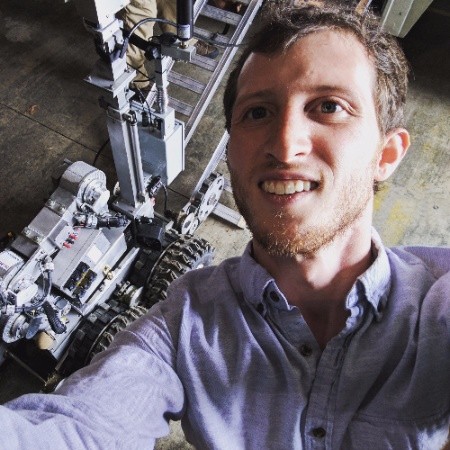Are the days of flying across the country for a one-hour meeting gone?
While many companies are still navigating whether or not they want to bring employees back to the office, and how, it’s likely true that the office is changing rather than disappearing altogether. But whichever side of the remote vs. IRL fence they’re on, the past 15 months of disruption have changed the way startup founders build their businesses, now and into the future.
For one, the rise of remote work has proven even to fans of in-person collaboration that there are benefits — like the elimination of geographic barriers.

Adam Stager. (Photo via LinkedIn)
Adam Stager, the founder of Newark, Delaware-based agtech company TRIC Robotics, said he misses working with colleagues in person: “I miss seeing people’s faces,” he told Technical.ly during a roundtable discussion with other startup pros. “I believe relationship-building in that way was stronger.”
On the flipside, remote work has helped him expand his professional network.
“The network here is limited to geographic location,” Stager said. “Virtual events have expanded our networks to as far as California.”
It’s also opened up new opportunities that were previously inaccessible. Roselle Safran is the founder and CEO of KeyCaliber, cybersecurity company that recently celebrated its selection for the HearstLab business program. Participation would not have been possible if not for the remote work norms of the pandemic.

Roselle Safran. (Photo via LinkedIn)
“They invest and also have a yearlong program where the companies selected for it move to New York for a year,” Safran said. “We’re based in D.C. Having that suddenly being an option that we wouldn’t have the ability to tap into in a non-pandemic environment — we were uniquely lucky in how that all panned out.”
Another benefit: Virtual meetings from home minimize the need for business travel. Safran prefers virtual meetings to having to travel to other places for a short time. Saving time, money and energy has been a refreshing experience in reimagining what is required for business meetings, she said.
“It’s immensely efficient to do more at home,” the CEO said. “There’s something to be said for in-person interactions, but sometimes I wonder if the tradeoff really makes sense. If you have to spend a day going out to California to have an hourlong meeting, that’s the equivalent of eight or nine meetings at home. I think ideally, I’d like to make the default to start with meetings at home.”

Antonia Dean. (Photo via LinkedIn)
To Comcast’s director of startup pipeline diversity, Antonia Dean, it’s an access issue.
“I think about how accessible folks are and how being able to take meetings from home has leveled the playing field in a number of ways,” she said. “I hope we keep an element of this. To Roselle’s point, it’s about [employees’] ability to generate ideas and execute, and not their ability to get across the country at a moment’s notice.”
Still, despite these benefits — which, don’t forget, were forced by a deadly pandemic — the past year has laid bare the inequities within society at large. Alongside work shifts, there’s been a renewed call for increased opportunities for small businesses, especially those founded by people of color.
Much of that has been “lip service,” according to one Maryland founder.

Andrew Suggs. (Courtesy photo)
Andrew Suggs is the cofounder and CEO of Live Chair Health, a company that brings health screening tools to barbershops. The past year has been eventful as Suggs has gotten national attention for finding ways to fight COVID-19 through community and stakeholder engagement. But to him, action against systemic issues such as a lack of equity for business owners of colors matters more than press conferences and photo opportunities.
“I think a lot of what I hear is lip service and photo opportunities, and once there is a new story we’re all focused on something else,” he said. “I told my team the work we’re doing is not just about photo opportunities but moving the needle and making things more equitable.”
“As an example,” he said, “you have all these people talking about funding small businesses, but after talking to hundreds of founders, there are no checks rolling in.”
Whether things will change permanently going forward — be they building networks or expanding access — is still an open question. But as we reopen, it’s worth taking a moment to reflect on what things were like during this time, and whether there’s reason to take action as a result.
Michael Butler is a 2020-2022 corps member for Report for America, an initiative of The Groundtruth Project that pairs young journalists with local newsrooms. This position is supported by the Lenfest Institute for Journalism.Before you go...
Please consider supporting Technical.ly to keep our independent journalism strong. Unlike most business-focused media outlets, we don’t have a paywall. Instead, we count on your personal and organizational support.
3 ways to support our work:- Contribute to the Journalism Fund. Charitable giving ensures our information remains free and accessible for residents to discover workforce programs and entrepreneurship pathways. This includes philanthropic grants and individual tax-deductible donations from readers like you.
- Use our Preferred Partners. Our directory of vetted providers offers high-quality recommendations for services our readers need, and each referral supports our journalism.
- Use our services. If you need entrepreneurs and tech leaders to buy your services, are seeking technologists to hire or want more professionals to know about your ecosystem, Technical.ly has the biggest and most engaged audience in the mid-Atlantic. We help companies tell their stories and answer big questions to meet and serve our community.
Join our growing Slack community
Join 5,000 tech professionals and entrepreneurs in our community Slack today!

The person charged in the UnitedHealthcare CEO shooting had a ton of tech connections

Delaware students take a field trip to China using their tablets and ChatGPT

Northern Virginia defense contractor acquires aerospace startup in $4B deal



